Top Locations in the United States Where College Graduates Earn the Highest Salary Premium
This post may contain affiliate links. As an Amazon Associate, we earn from qualifying purchases.
While the value of a college degree in accessing lucrative career opportunities is widely acknowledged, pinpointing where in the United States college graduates earn significantly higher salaries than their non-degree-holding counterparts remains an intriguing question. Delving into nationwide earnings data, Career.io embarked on this investigative journey.
Across the United States, pursuing higher education post-high school has become a norm for many. Yet, beyond the pursuit of knowledge lies the expectation of accessing well-paying jobs, with a staggering seven in ten Americans believing that individuals with college degrees earn more than those with only a high school diploma.
While it’s undeniable that some high school graduates secure lucrative positions early on, statistics reveal that, on average, college graduates in the United States accumulate $1.2 million more in lifetime earnings than their non-college-educated peers and are 3.5 times less likely to face poverty, particularly evident among male graduates who tend to command higher salaries.
This prompted the Career.io team to ponder: In which regions of the United States do college graduates enjoy the most significant salary premiums over non-degree holders? And where do both male and female graduates surpass their non-degree-holding counterparts in earnings the most?
Employing Census data, Career.io analyzed the median earnings disparity between local college graduates and high school graduates aged 25 and above across every state and the 1,000 most populous cities in the nation.
Table of Contents
- Key Findings
- California College Graduates Earn 96.56% More Than High School Graduates
- Female Graduates in New Jersey Earn 105.27% More Than Non-Degree Counterparts
- The City in Each U.S. State Boasting the Highest Salary Premium for College Graduates
- Hoboken, New Jersey, and Silicon Valley cities are home to the highest salary premiums
- Male College Graduates in a Georgia City Earn 341.92% More Than Non-Degree Counterparts
- Big Earnings Aren’t Guaranteed by College Degrees
- Methodology
Key Findings
- California boasts the highest salary premium for college graduates, with an impressive 96.56% increase ($37,181) compared to workers without degrees.
- In Hoboken, New Jersey, college graduates enjoy the largest wage gap, earning 305.63% more ($81,478) than local workers without degrees.
- Conversely, in Gary, Indiana, the typical college graduate earns $18,750 less (-50.22%) than their non-degree-holding counterparts, marking the largest negative premium among cities.
- Female graduates in Edina, Minnesota, experience the most significant salary premium over their non-degree counterparts, with a substantial 390.29% increase ($54,059), while male graduates in Johns Creek, Georgia, lead with a premium of 341.92% ($89,444).
California College Graduates Earn 96.56% More Than High School Graduates
No matter which state you reside in, holding a bachelor’s degree significantly boosts your earning potential compared to those without higher education credentials. Our research highlights that across all states, individuals with degrees command substantial salary premiums over their non-degree-holding counterparts, with California leading the pack. In the Golden State, college graduates enjoy an impressive 96.56% increase (equivalent to $37,181) compared to high school graduates.
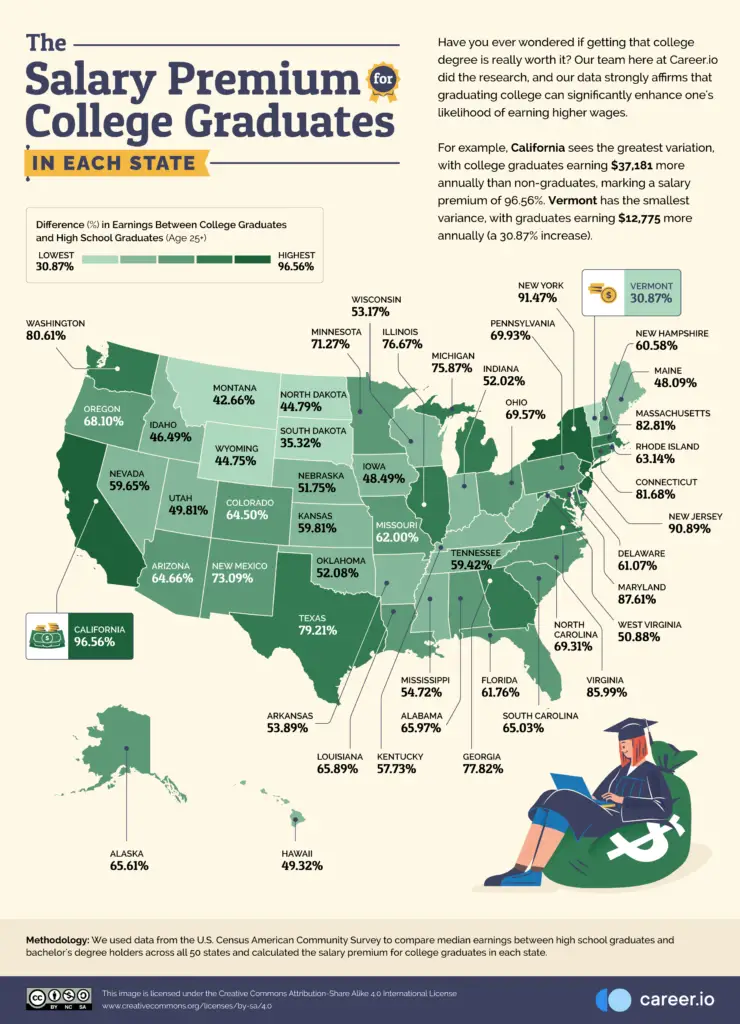
In both college graduates and non-degree holders, a common concern emerges – the exorbitant cost of living, which forces many workers to leave excessively expensive metropolitan areas such as Los Angeles and San Francisco. Following California, New York presents a similar trend, with a typical graduate earning 91.47% more (equivalent to $34,190) than someone without a college degree. Similarly, New Jersey showcases a substantial price premium of 90.89% (or $36,532).
Female Graduates in New Jersey Earn 105.27% More Than Non-Degree Counterparts
Despite comprising over half of the college-educated workforce in the U.S., where do women with degrees outstrip their non-degree-holding counterparts the most? New Jersey claims the top spot in this regard, with the average female employee holding a bachelor’s degree earning $33,170 more than a female high school graduate, marking a significant 105.27% salary premium.
The Institute for Women’s Policy Research notes, ‘A growing portion of employed women in New Jersey are occupying managerial or professional roles.’ These positions, constituting approximately 45% of women’s employment, typically demand a four-year degree and offer higher wages and employment benefits.
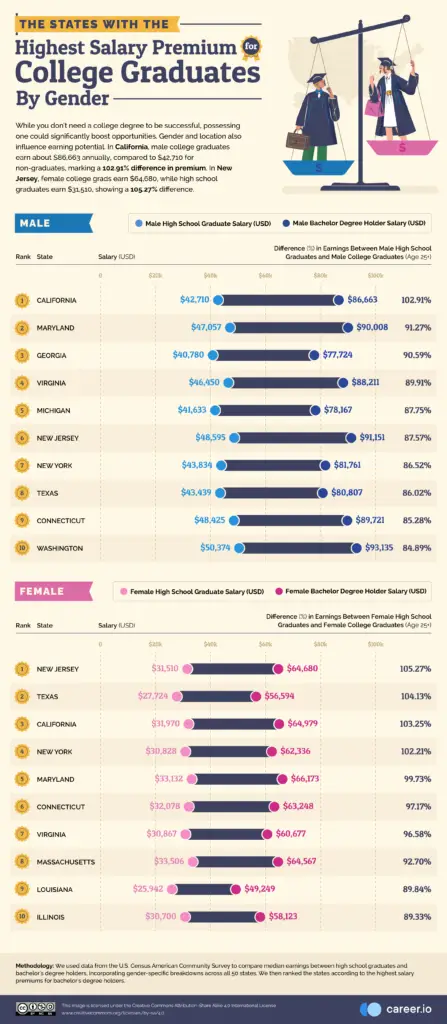
Male college graduates in California earn $43,953 more than their high school graduate counterparts, resulting in a 102.91% increase in salary. Notably, in Big Tech firms of Silicon Valley, men occupy 70% of managerial and professional roles, highlighting a significant gender disparity. Following California, Maryland presents a substantial premium of 91.27% (or $42,951).
In both states, individuals, regardless of gender, holding a bachelor’s degree can anticipate lifetime earnings reaching $3.1 million, marking one of the highest totals nationwide.
The City in Each U.S. State Boasting the Highest Salary Premium for College Graduates
Following that, the career.io team identified the city in each state where college graduates enjoy the most significant salary premiums compared to high school graduates. Novi, Michigan, stands out prominently in this regard, with an astounding difference: on average, a college graduate earns approximately $57,703 more (a premium of 258.19%) than someone without a degree. In late 2023, the state’s governor announced the creation of 200 “high-paying” engineering jobs in Novi, a sector typically requiring a bachelor’s degree.
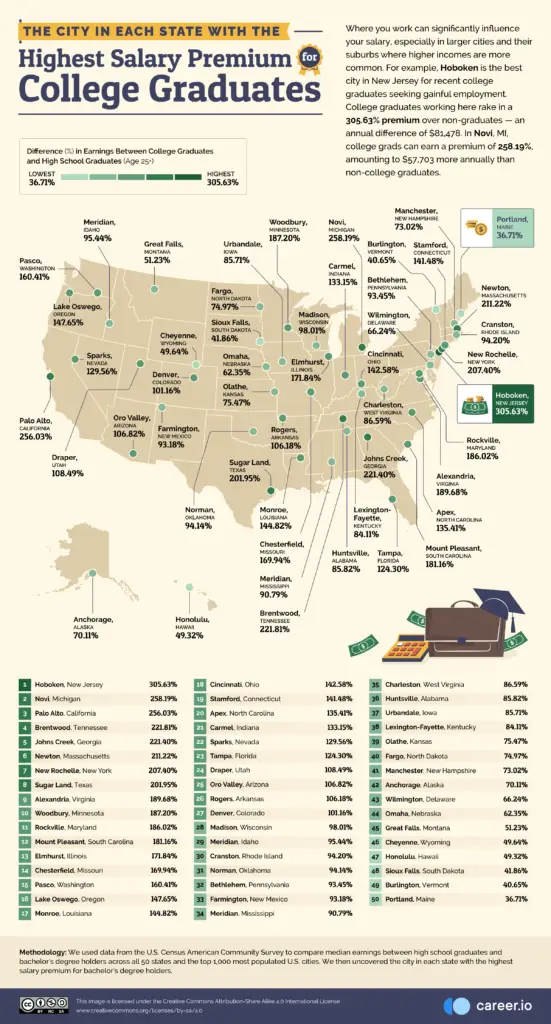
Palo Alto leads the way in California, boasting a staggering salary premium for degree holders of $81,503 (equivalent to 256.03%) over workers without degrees. Historically, Palo Alto has been synonymous with a highly educated populace; during the 1950s, over one in three local men held a degree, a notable feat considering only 7% of American adults had completed four years of college at the time. The city’s association with exceptional salaries is further amplified by its integration into Silicon Valley, where in 2022, the top 5% of earners in the region averaged nearly $700k in annual salaries.
When assessing the top 10 cities with the highest salary premiums for graduates, two additional Silicon Valley locales emerge alongside Palo Alto: Cupertino, where college graduates enjoy a premium of 232.50% (or $96,295), and Mountain View, where the premium stands at 226.96% (or $90,928). Interestingly, despite the tech-driven nature of Silicon Valley careers, industry giants like Google and Apple are progressively less reliant on requiring degrees for employment.
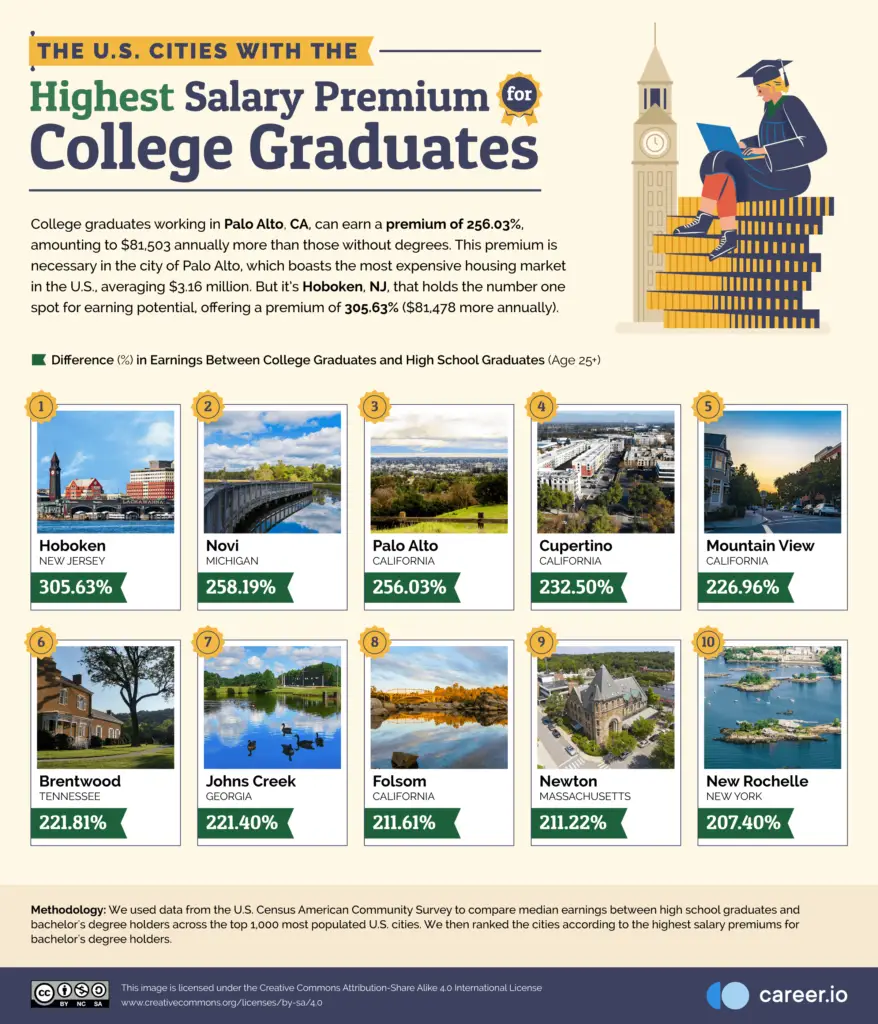
However, towering above all others is Hoboken, New Jersey, where the average college graduate commands an astounding premium of 305.63% (or $81,478) over their non-degree-holding counterparts. Notably, graduates from the city’s Stevens Institute of Technology out-earn their peers from any other college in New Jersey, including the esteemed Princeton University.
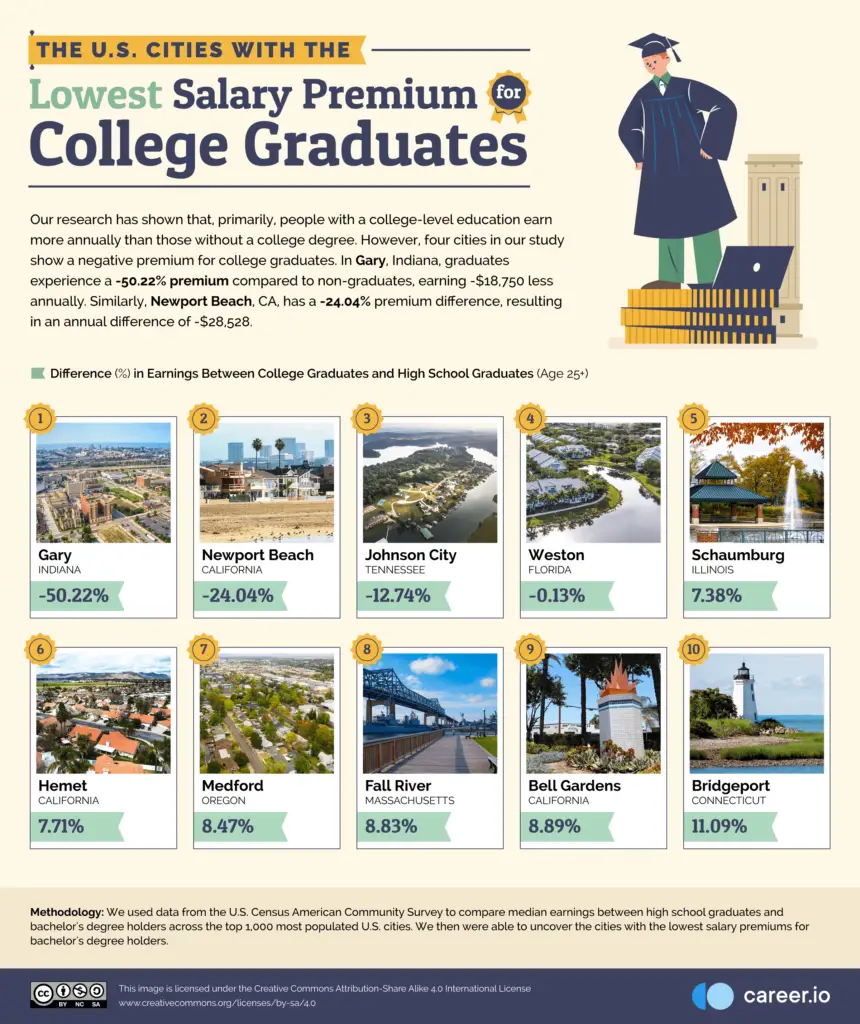
Conversely, the situation contrasts sharply in other U.S. cities. In Gary, Indiana, the average degree holder earns $18,750 less than a non-degree worker, resulting in a negative premium of -50.22% — the highest across any city in the nation. The most prevalent job categories in Gary include Office & Administrative Support Occupations (3,251 individuals), Material Moving Occupations (2,092 individuals), and Sales & Related Occupations (1,895 individuals).
Male College Graduates in a Georgia City Earn 341.92% More Than Non-Degree Counterparts
In Johns Creek, one of Georgia’s most affluent cities, male college graduates enjoy a remarkable premium of 341.92% (equivalent to $89,444) over their non-degree-holding counterparts. This city’s primary industries revolve around life sciences and healthcare. Similarly, in Newton, Massachusetts, male college graduates also reap significant rewards, boasting a healthy premium of 310.04% (or $104,699) over men without degrees. Notably, Newton is home to two of the wealthiest men in America, both of whom hold college degrees.
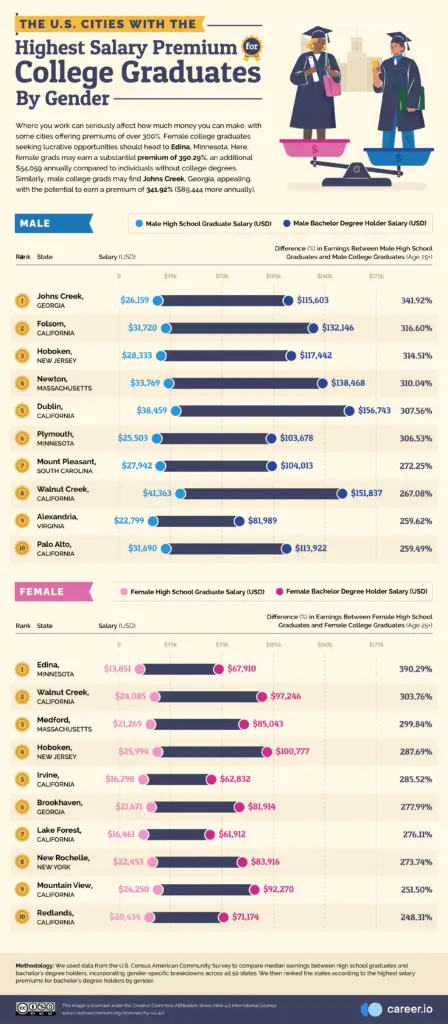
Shifting focus to female graduates, Edina, Minnesota, emerges as the city with the highest salary premium, where women with college degrees earn a staggering 390.29% more (or $54,059) than those without degrees. In Edina, women command substantial earnings in agriculture, forestry, fishing, hunting, and mining, with the median salary for women in this industry reaching a quarter of a million dollars.
Big Earnings Aren’t Guaranteed by College Degrees
The research uncovers instances where individuals with degrees potentially earn several times the salary of their counterparts without degrees. However, it doesn’t guarantee that obtaining a degree ensures substantial earnings. Even within the most prestigious universities in the U.S., certain majors are associated with annual salaries of less than $30,000.
It also fails to indicate that forgoing college will permanently hinder your earning potential. Many of the world’s largest and highest-paying companies are beginning to relax their requirements for a college degree. Take Google, for example, where employees can earn hundreds of thousands of dollars annually. The proportion of Google job postings mandating a bachelor’s degree decreased from 93% to 77% between 2017 and 2021. Similarly, at Apple, this requirement decreased by 18%.
In a country where 51% of individuals are forced to drop out of college due to financial constraints and where 34% of young adults cannot attend college at all due to prohibitive costs, these developments signify positive news.
Methodology
To determine where college graduates earn the most significant salary premium in the United States, the career.io team concentrated on the 1,000 most populous cities and each state.
For each city and state, the team utilized data from the U.S. Census American Community Survey (2022) to identify the median earnings over the past 12 months (adjusted for inflation) for individuals aged 25 and older among High School Graduates, High School Graduate Males, High School Graduate Females, Bachelor’s Degree Holders, Bachelor’s Degree Holding Males, and Bachelor’s Degree Holding Females.
The career.io team computed the percentage difference in earnings for each location between high school graduates and bachelor’s degree holders. This analysis was then repeated for male and female high school graduates versus bachelor’s degree holders of the same gender.
Subsequently, the team ranked the cities, cities within each state, and states based on the highest salary premium (%) for bachelor’s degree holders.
The analysis of this data is accurate as of February 2024.

Interesting how your reporting indicates this extreme higher income for college degrees, yet here we are with the non-college degree individuals paying for the high-income individuals school loans because they cannot afford to pay it themselves!!! Maybe it should be about value and return on the investment determined by overall financial position of individuals, versus a small number of suspect – fabricated and exhorbent examples of great difference strictly due to a college degree. How about comparing a 4-year college degree to a vocational degree giving all-encompassing analysis of income, financial stability, outstanding debt and accumulated personal assets???
Some private tech schools are very expensive and have digested millions of dollars of loan money too. There is no perfect solution and much of the forgiveness is interest that was set unrealistically high and did not follow the market rate. Once employed, these students will be paying taxes.
Does this study take into account cost of living differences between areas? Without that the salary premiums would be meaningless.
Carried out to the hundredths of a percent?! ….two extra digits that carries very little value and is a distraction for readers?…otherwise an interesting map.
I think it would be more beneficial to see the types of degrees more than just selecting “degrees”. That would give a clearer picture: degrees in English or history don’t quite match the earnings of engineering or computer skills.
I am a student and I think it is amazing 5 stars